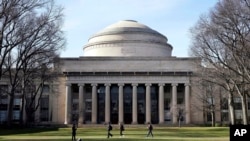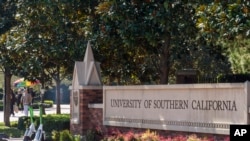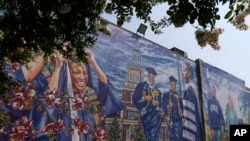Student Union
US Lawmaker Cites Concerns About Chinese Institutes

A U.S. senator from Missouri has written the state university system and a private liberal arts university to express his concerns about Chinese espionage and Confucius Institutes on campus.
Republican Senator Josh Hawley directed his concerns to the University of Missouri and Webster University, which host Confucius Institutes.
Confucius Institutes and centers around the world offer language and cultural programs that, in the past few years, have been accused of spreading Chinese propaganda. Several colleges and universities worldwide have ended their relationships with the institutes and shuttered their on-campus facilities as tensions over Chinese spying in the U.S. have grown.
Hawley was motivated by a U.S. Senate Judiciary Committee hearing this week with FBI Director Chris Wray.
'Source of concern'
Chinese Confucius Institutes at American universities are a "source of concern," Hawley said, because they allow the Chinese government to disseminate communist propaganda, encourage censorship and restrict academic freedom.
Hawley said a number of U.S. colleges and universities have closed their Confucius Institutes in the past year, including Texas A&M University, the University of Iowa, University of Michigan-Ann Arbor, University of Minnesota-Twin Cities and North Carolina State University.
"Both the University of Missouri and Webster University should follow their examples," Hawley tweeted.
University of Missouri spokesman Christian Basi said the school appreciated Hawley's letter and shared many of his concerns related to academic espionage.
"This is something that has been on the radar of our top leadership for the last one to two years," Basi said. "We also have periodically met with the FBI, both at national conferences when they provided information, as well as meeting with them here on campus."
Webster University, in suburban St. Louis, said it felt confident its oversight of the campus Confucius Institute was sound.
"We take academic freedom very seriously and will not sacrifice it for the sake of any relationship," Webster President Elizabeth Stroble wrote. "Our arrangement with Hanban expressly reserves for Webster University the right to determine the curricula and the manner of instruction for all programs that we offer. Nothing in our agreements concerning the Confucius Institutes restricts us from addressing any academic subject."
The Hanban is a Chinese state agency chaired by a member of the Politburo and the vice premier of the People's Republic of China.
Of the more than 1 million international students in the U.S., more than 300,000 are Chinese, according to the Institute of International Education.
Organization cites demand
"As China's economy and exchanges with the world have seen rapid growth, there has also been a sharp increase in the world's demands for Chinese learning," according to the Confucius Institute website.
Chinese influence has been a top concern of U.S. intelligence agencies.
The FBI’s Wray, who testified before lawmakers including Senator Lindsey Graham, a Republican from South Carolina, said the agency has "a thousand open investigations … involving attempted theft of intellectual property," and almost all the cases involved the Chinese. He called it "deep, diverse, wide and vexing."
A statement from the American Association of University Professors published in 2014 said, "Confucius Institutes function as an arm of the Chinese state and are allowed to ignore academic freedom."
See all News Updates of the Day
US remains top choice for Indian students going abroad
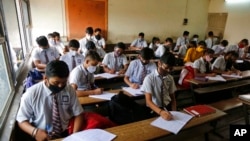
About 69% of Indian students traveling abroad for their studies chose the United States, according to a Oxford International’s Student Global Mobility Index. Other popular choices were the United Kingdom, Canada and Australia.
Education Times reports the main influencers for deciding where to study abroad – for Indian students and others – were parents. (April 2024)
Malaysian official: Schools can’t turn away from global tensions

Zambry Abdul Kadir, Malaysia’s higher education minister, said protests spreading across universities in the United States show that schools can’t ignore political tensions.
Helen Packer, reporting in Times Higher Education, said the minister reminded educators that universities are key in the development of leaders, individuals and societies. (April 2024)
Social media breaks are difficult, but necessary

Between online classes, maintaining social connections and working on projects, college students can have a hard time disengaging from the demands of technology.
In Florida International University’s PantherNOW, Ariana Rodriguez offers strategies for taking a break from social media. (April 2024)
- By Melos Ambaye
Many master's degrees aren't worth the investment, research shows

Nearly half of master's degrees have a negative financial return, according to new research by the Foundation for Research on Equal Opportunity, an economic research organization.
The study indicates that many graduate degree programs do not increase lifetime earnings enough to be worth it.
While 23% of bachelor’s degree programs yield a negative financial return on investment, 43% of two-year degrees and master’s degrees fail to deliver a return, according to the study by Preston Cooper, a senior fellow at FREOPP.
Cooper assessed the return on investment for 53,000 degree and certificate programs to determine whether a student’s lifetime earnings outweigh program costs and the risk of not completing their degree.
His findings show that a student’s field of study was the overriding indicator of return on investment at the undergraduate and graduate level.
Engineering, computer science and nursing bachelor’s degrees have high financial returns on investment, while programs in education, fine arts, psychology and English usually have low returns.
Graduate degrees in medicine and law tend to have strong payoffs. But a large share of master’s programs, including the MBA, frequently have low payoffs, according to Cooper.
Although workers with master’s degrees earn 16% more than those with only bachelor’s degrees, Cooper says the figure fails to account for students who had “higher preexisting earnings potential.”
“MBA students typically have high preexisting earnings potential, having often chosen high-ROI undergraduate majors such as finance and economics,” Cooper writes. “So the MBA adds little value on top of that.”
The study indicates that high starting salaries are predictors of high returns on investment. Degrees with starting salaries of $57,000 a year or more deliver the best lifetime returns.
But the return on investment of a degree can vary depending on the educational institution.
“Students interested in fields with low average pay can still find some schools that do well transforming those fields of study into high-paying careers,” Cooper writes.
The quality of an institution also matters, said William Tierney, professor emeritus of higher education at the University of Southern California.
“An MBA from Harvard is a likely ticket to a good job,” Tierney told VOA. “An MBA from the University of Phoenix, less so.”
But students pursue graduate programs for more than just financial reasons.
“Some degrees open up careers in fields that students may enjoy, such as in the performing arts,” Robert Kelchen, head of educational leadership at the University of Tennessee, Knoxville, told VOA.
“Others can help gain access to social networks or simply help students learn about a topic that is of interest,” Kelchen added.
Cooper told VOA that it might make sense for students in degree programs with low returns on investment to switch majors if they can still graduate on time.
He found the worst outcome for a student’s return on investment is dropping out of college “because they must pay for one or more years’ tuition and spend time out of the labor force.”
Lawmakers who fund higher education have a responsibility in ensuring “higher education delivers on its promise of economic mobility,” Cooper said.
Nearly a third of federal funding, including Pell grants and student loans, pays for higher education programs that fail to provide students with a return on investment, according to the study.
Cooper’s view is that “some schools should shut down low-ROI programs and reallocate institutional resources to programs with a better return.”
“There's definitely this narrative out there that higher education is always worth it, and you should always try to get that extra degree because it will increase your earnings,” he told VOA. “That's reinforced by colleges who make lofty promises regarding their graduate degree programs' outcomes, which all too often fall short.”
Harvard students end protest as school agrees to discuss Gaza conflict
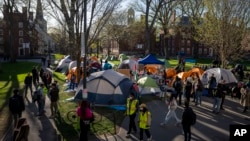
Protesters against the war between Israel and Hamas were voluntarily taking down their tents in Harvard Yard on Tuesday after university officials agreed to discuss their questions about the endowment, bringing a peaceful end to the kinds of demonstrations that were broken up by police on other campuses.
The student protest group Harvard Out of Occupied Palestine said in a statement that the encampment "outlasted its utility with respect to our demands." Meanwhile, Harvard University interim President Alan Garber agreed to pursue a meeting between protesters and university officials regarding the students' questions.
Students at many college campuses this spring set up similar encampments, calling for their schools to cut ties with Israel and businesses that support it.
The Israel-Hamas war began when Hamas and other militants stormed into southern Israel on October 7, killing some 1,200 people and taking 250 hostages. Palestinian militants still hold about 100 captives, and Israel's military has killed more than 35,000 people in Gaza, according to Gaza's Health Ministry, which doesn't distinguish between civilians and combatants.
Harvard said its president and the dean of the Faculty of Arts and Sciences, Hopi Hoekstra, will meet with the protesters to discuss the conflict in the Middle East.
The protesters said they worked out an agreement to meet with university officials, including the Harvard Management Company, which oversees the world's largest academic endowment, valued at about $50 billion.
The protesters' statement said the students will set an agenda that includes discussions on disclosure, divestment, reinvestment and the creation of a Center for Palestine Studies. The students also said that Harvard has offered to retract suspensions of more than 20 students and student workers and back down on disciplinary measures faced by 60 more.
"Since its establishment three weeks ago, the encampment has both broadened and deepened Palestine solidarity organizing on campus," a spokesperson for the protesters said. "It has moved the needle on disclosure and divestment at Harvard."




